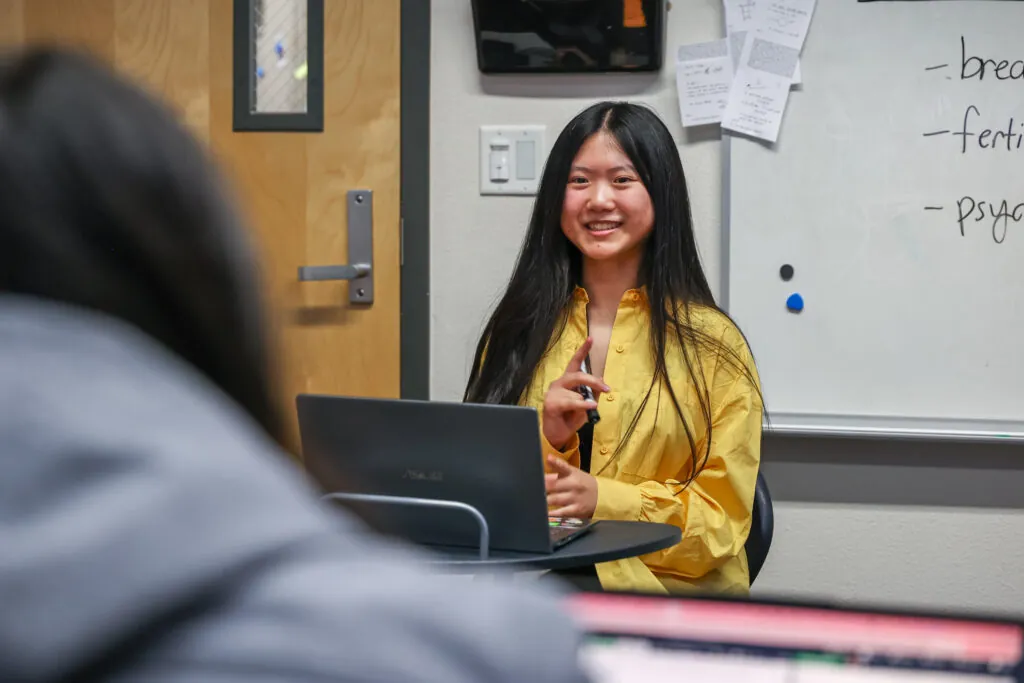Assessment
The academic readiness assessment is a crucial part of how we determine whether the Academy will be a good fit for assessing students for the Davidson Academy.
How is an Assessment Scored?
- Math (30 points)

- Science Reasoning (30 points)
- Language Proficiency Test (10 points)
- Critical Reading, Academic Discussion, and Abstract Thinking (25 points)
- Skills: making logical inferences, ability to think abstractly, reading critically, etc. (rated both before
and after instruction has been given)
- Skills: making logical inferences, ability to think abstractly, reading critically, etc. (rated both before
- Written Expression (25 points)
- Skills: control of conventions, logical and efficient sentences, word choice, clarity of expression, etc.
- Affective Traits (25 Points)
- Skills: social-emotional orientation toward schoolwork, remaining on task, receptivity to instruction,
active listening, conscientiousness toward work, attention to detail, following directions, etc.
- Skills: social-emotional orientation toward schoolwork, remaining on task, receptivity to instruction,
- We look for prospective students to score an 80% or better, but we also accept students who score 70% or better if the rest of their application is strong (teacher recommendations, grades, IQ scores, etc.).
- Any student who does not score high enough is welcome to apply again the next year. It is not unusual (though certainly not guaranteed) for students to get in on their second try.
- We have multiple raters scoring every application, and if two raters come up with scores that are different by more than a couple points, we bring in more raters and discuss that applicant in depth, looking at all of information in their application.
The Academy has been characterized as a “writing across the curriculum” school. Does this mean the assessment is primarily a writing test?
Writing is an important aspect of Academy curriculum because we associate academic challenge with the opportunity for students to present understanding in their own words. The readiness assessment has been designed to accurately reflect Academy curriculum and, thus, written expression is proportionately reflected.
Additionally, the assessment live sessions do include writing because this is the best way for us to assess critical thinking and reading skills.
Are students who have not had good writing instruction unfairly disadvantaged relative to those who have?
Among our pool of applicants, it has been extremely rare to find students who have received effective writing instruction in exposition or argument. Probably less than 2% of our total pool of applicants demonstrate prior access to this kind of instruction. This fact reflects trends in public and private education that value creative writing over expository writing, and it essentially places all of our applicants on a level playing field. Moreover, we have normed our assessment expectations based on the idea that most students have not had this type of instruction.
What does the website mean by “curriculum-based measurement,” and how do you decide which material will be used on the assessment?
The majority of the materials used at assessment have come directly from our own curriculum. In selecting the material from our curriculum, we use the following guidelines:
- We look critically at potential assessment items to be sure that they were extremely effective when we used them in our classrooms.
- We only utilize material that has met with universal success when it was presented to our current students so that expectations are crafted in a fair and consistent manner.
- We opt for materials that will offer the maximum amount of accessibility to applicants who vary widely in terms of academic experience and maturity.
Helpful tips for assessment:
- There is a lot to do today, so you will need to be focused and work hard, but you may work at your own pace throughout most of the day.
- Just like in our actual classes, you will receive a great deal of feedback to help you improve your work. Please accept the feedback as our way of helping you…not criticizing you. Published writers always work with editors; substantially revising your work is part of the process of writing.
- We are looking at not only your academic skills but also your behavior, attitude, work ethic, and ability to follow directions. We look for solid effort and the willingness to ask for help—we want you to take responsibility for producing the very best work you are able to generate.